UNIT 11 CONFLICT AND COMPROMISE LESSON 2课件(共39张,内嵌视频)-高中英语北师大版(2019)选择性必修第四册
文档属性
| 名称 | UNIT 11 CONFLICT AND COMPROMISE LESSON 2课件(共39张,内嵌视频)-高中英语北师大版(2019)选择性必修第四册 | 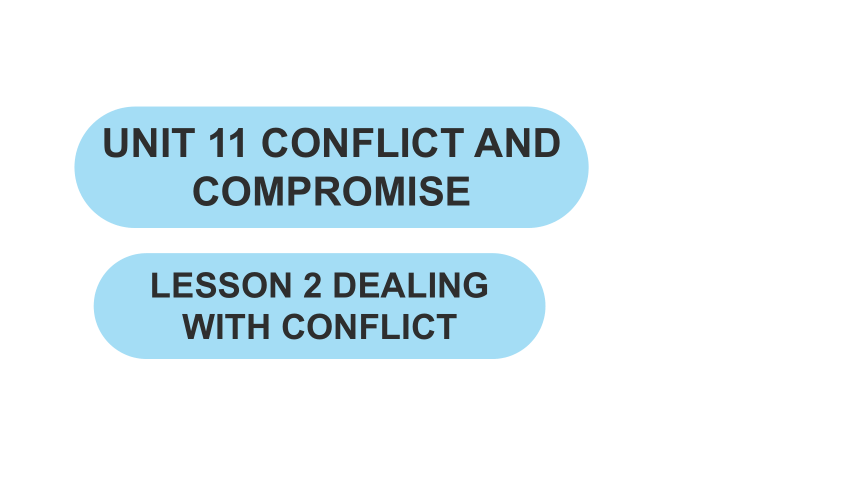 | |
| 格式 | pptx | ||
| 文件大小 | 8.9MB | ||
| 资源类型 | 教案 | ||
| 版本资源 | 北师大版(2019) | ||
| 科目 | 英语 | ||
| 更新时间 | 2025-04-01 20:39:43 | ||
图片预览

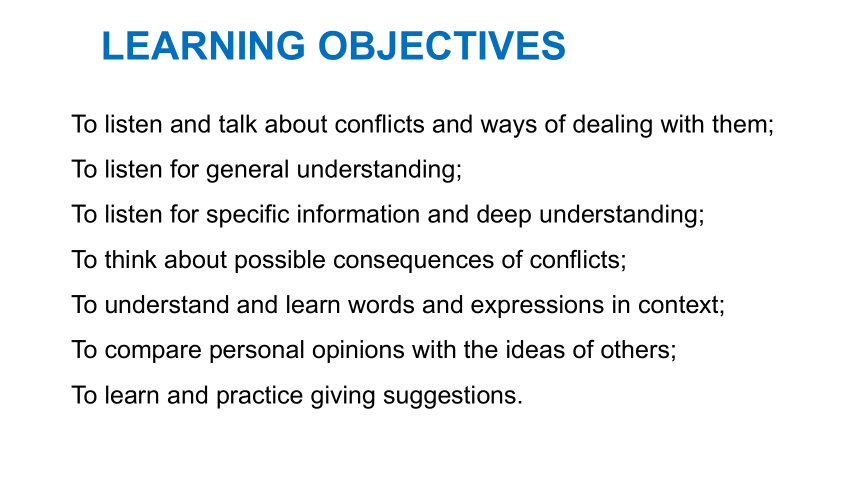
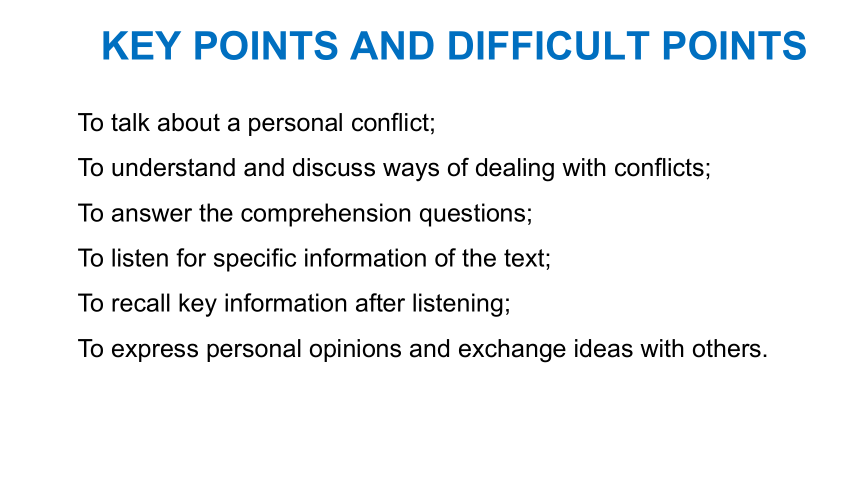
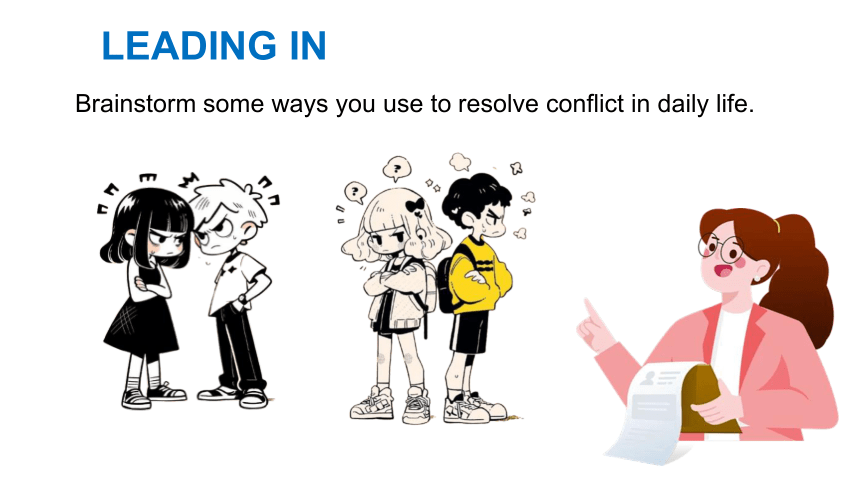
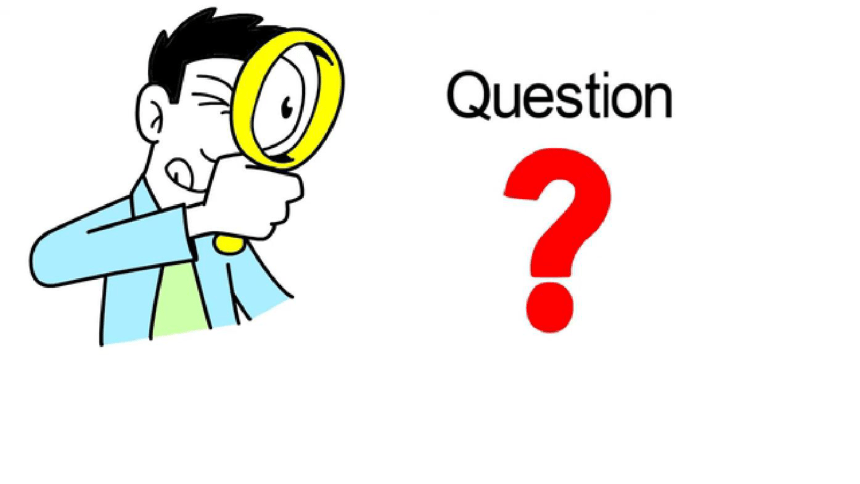

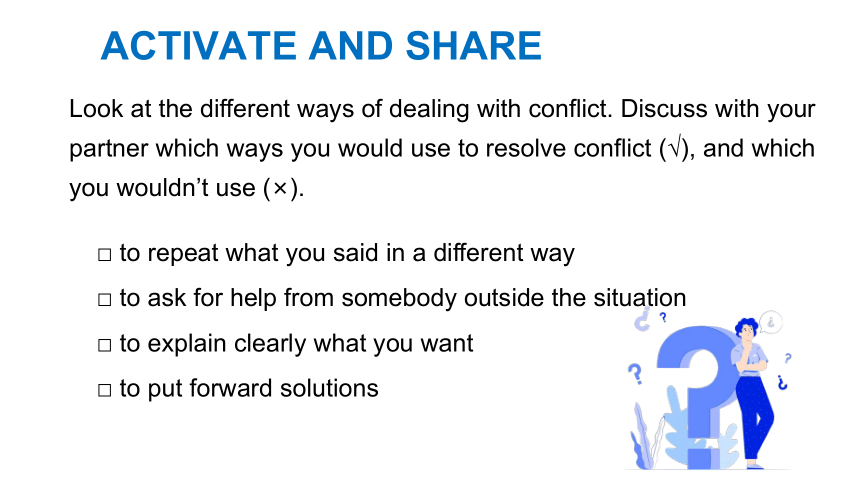
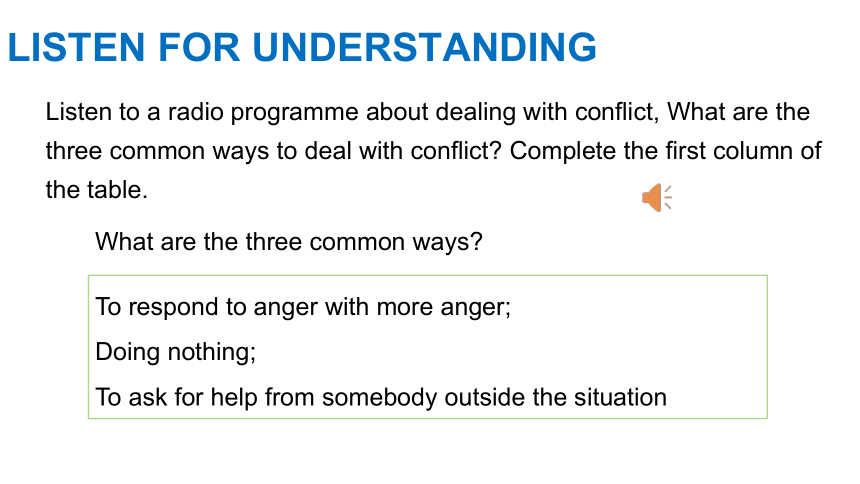
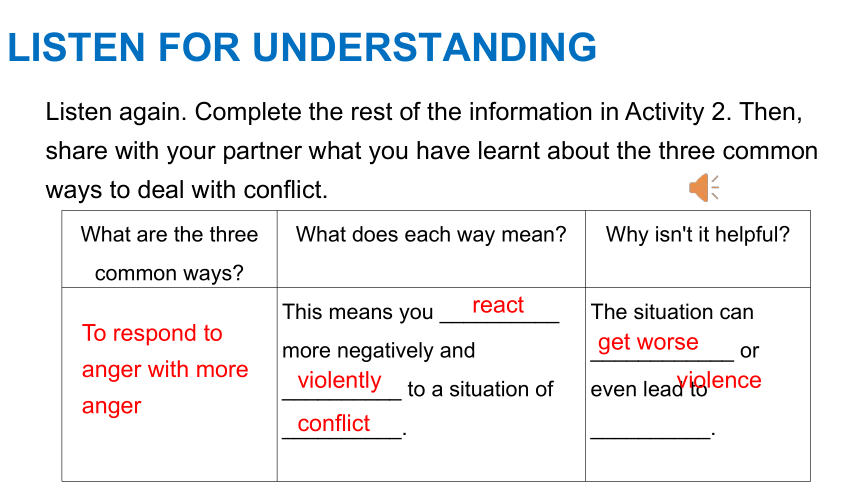
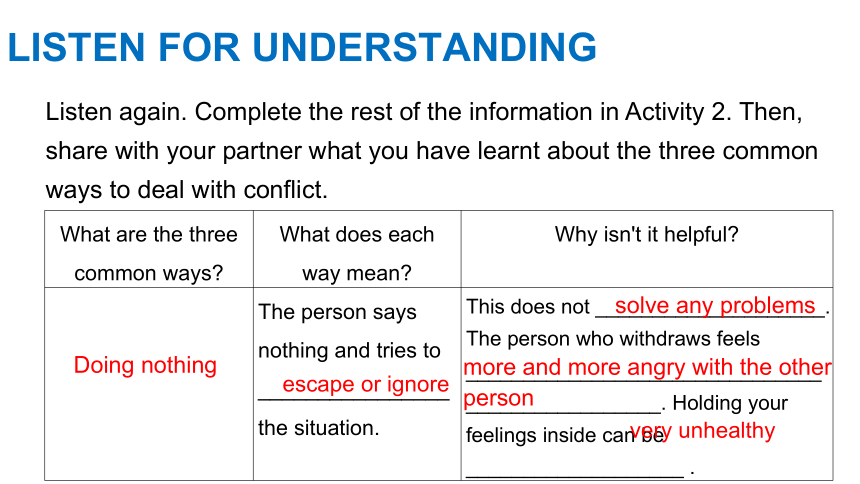
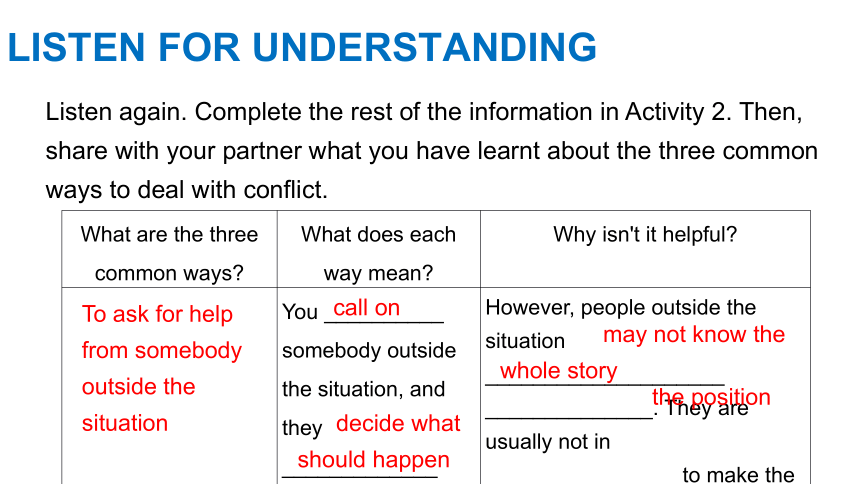
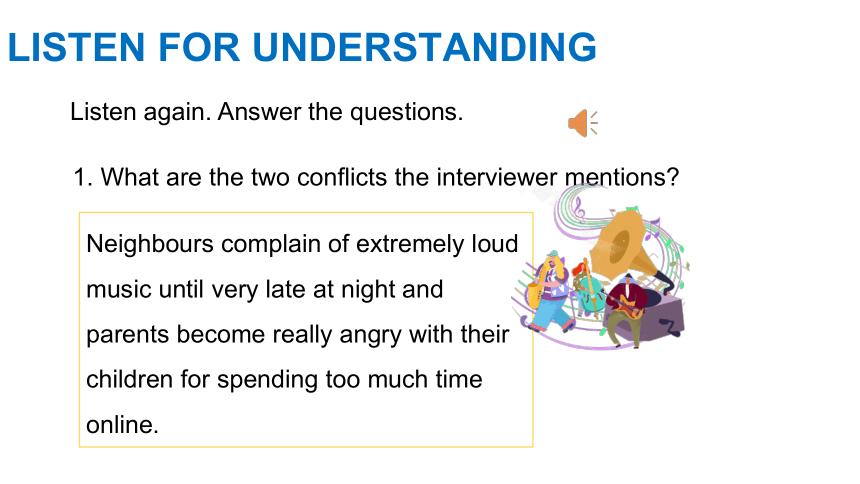
文档简介
(共39张PPT)
LESSON 2 DEALING WITH CONFLICT
UNIT 11 CONFLICT AND COMPROMISE
LEARNING OBJECTIVES
To listen and talk about conflicts and ways of dealing with them;
To listen for general understanding;
To listen for specific information and deep understanding;
To think about possible consequences of conflicts;
To understand and learn words and expressions in context;
To compare personal opinions with the ideas of others;
To learn and practice giving suggestions.
KEY POINTS AND DIFFICULT POINTS
To talk about a personal conflict;
To understand and discuss ways of dealing with conflicts;
To answer the comprehension questions;
To listen for specific information of the text;
To recall key information after listening;
To express personal opinions and exchange ideas with others.
LEADING IN
Brainstorm some ways you use to resolve conflict in daily life.
ACTIVATE AND SHARE
Look at the different ways of dealing with conflict. Discuss with your partner which ways you would use to resolve conflict (√), and which you wouldn’t use (×).
□ to respond to anger with more anger
□ to negotiate with the other person
□ to do nothing or try to escape
□ to solve the problem yourself
ACTIVATE AND SHARE
Look at the different ways of dealing with conflict. Discuss with your partner which ways you would use to resolve conflict (√), and which you wouldn’t use (×).
□ to repeat what you said in a different way
□ to ask for help from somebody outside the situation
□ to explain clearly what you want
□ to put forward solutions
LISTEN FOR UNDERSTANDING
Listen to a radio programme about dealing with conflict, What are the three common ways to deal with conflict Complete the first column of the table.
What are the three common ways
To respond to anger with more anger;
Doing nothing;
To ask for help from somebody outside the situation
LISTEN FOR UNDERSTANDING
Listen again. Complete the rest of the information in Activity 2. Then, share with your partner what you have learnt about the three common ways to deal with conflict.
What are the three common ways What does each way mean Why isn't it helpful
This means you __________ more negatively and __________ to a situation of __________. The situation can ____________ or even lead to __________.
To respond to anger with more anger
react
violently
conflict
get worse
violence
LISTEN FOR UNDERSTANDING
Listen again. Complete the rest of the information in Activity 2. Then, share with your partner what you have learnt about the three common ways to deal with conflict.
What are the three common ways What does each way mean Why isn't it helpful
The person says nothing and tries to ________________ the situation. This does not ____________________. The person who withdraws feels ________________________________________________. Holding your feelings inside can be ___________________ .
Doing nothing
escape or ignore
solve any problems
more and more angry with the other person
very unhealthy
LISTEN FOR UNDERSTANDING
Listen again. Complete the rest of the information in Activity 2. Then, share with your partner what you have learnt about the three common ways to deal with conflict.
What are the three common ways What does each way mean Why isn't it helpful
You __________ somebody outside the situation, and they _____________ _________________. However, people outside the situation ____________________
______________. They are usually not in ________________ to make the right judgment.
To ask for help from somebody outside the situation
call on
decide what should happen
may not know the whole story
the position
LISTEN FOR UNDERSTANDING
Listen again. Answer the questions.
1. What are the two conflicts the interviewer mentions
Neighbours complain of extremely loud music until very late at night and parents become really angry with their children for spending too much time online.
LISTEN FOR UNDERSTANDING
Listen again. Answer the questions.
2. What is the worst way of dealing with conflict according to Dr. Maguire
Respond to anger with more anger.
3. What is the best way recommended
Try to negotiate with the other person.
TAPESCRIPTS
(I=Interviewer D=Dr. Maguire)
I: Good afternoon. Today we’re going to talk about conflict,and how to deal with it. We have Dr. Maguire, from City University with us today. Good afternoon, Dr. Maguire.
D: Good afternoon.
I: Dr. Maguire, in our daily life, we may come across various conflicts. For example, neighbours complain of extremely loud music until very late at night and parents become really angry with their children for spending too much time online. In your opinion, what is the best way to deal with conflict
TAPESCRIPTS
D: Well, there are three common ways. The first way is to respond to anger with more anger. This means you react more negatively and violently to a situation of conflict. This is the worst way of handling conflict,because the situation can get worse or even lead to violence. Unfortunately, it is one of the most common ways of reacting to conflict.
I: Mm, that’s true.
D: Another way, which doesn’t work very well, is doing nothing.
TAPESCRIPTS
I: What do you mean
D: This is when the person says nothing and tries to escape or ignore the situation. They just hope that if they hold out for long enough, things will get better by and by. This does not solve any problem and the person who withdraws feels more and more angry with the other person. Holding your feelings inside can be very unhealthy.
I: Indeed. That’s very true.
D: Another possibility is to ask for help from somebody outside the situation.
TAPESCRIPTS
I: What do you mean exactly
D: Well, this is when you call on somebody outside the situation, and they decide what should happen. This can be useful, especially if the conflict is serious. However, people outside the situation may not know the whole story. They are usually not in the position to make the right judgement. Without doubt, the best thing to do is to try to negotiate with the other person.
I: Right. Thank you very much, Dr. Maguire. Let’s have a break and we’ll be back soon.
LISTEN FOR UNDERSTANDING
Read each situation and how the conflicts are resolved. Analyse their possible consequences. Give comments or recommendations on how to deal with each situation.
a. Amy did not do well in her maths exam, and her mother was very angry with her as a result. Amy argued that one exam would not mean total failure, but her mother did not agree. Amy's way to deal with the problem was refusing to talk to her mother for three days.
LISTEN FOR UNDERSTANDING
Read each situation and how the conflicts are resolved. Analyse their possible consequences. Give comments or recommendations on how to deal with each situation.
Not talking to her mother for three days would make both Amy and her mother feel very upset. It would be better if Amy and her mother went to the maths teacher and discuss Amy's problems and find a solution.
LISTEN FOR UNDERSTANDING
Read each situation and how the conflicts are resolved. Analyse their possible consequences. Give comments or recommendations on how to deal with each situation.
b. Bob accidentally stamped on a man's foot on the bus. The man was very angry and swore at Bob. Bob was angry, too. He yelled and swore back at the man.
LISTEN FOR UNDERSTANDING
Read each situation and how the conflicts are resolved. Analyse their possible consequences. Give comments or recommendations on how to deal with each situation.
This situation could have led on to a more serious argument and eventually get police involved in. The man could have complained and Bob could have said sorry right away.
LISTEN FOR UNDERSTANDING
Read each situation and how the conflicts are resolved. Analyse their possible consequences. Give comments or recommendations on how to deal with each situation.
c. Daisy thought Cathy had reported her to the teacher,even though Cathy had not. Daisy was so angry that she wouldn't allow Cathy to tell her side of the story. Therefore, Cathy asked her friend Fiona to talk to Daisy on her behalf.
LISTEN FOR UNDERSTANDING
Read each situation and how the conflicts are resolved. Analyse their possible consequences. Give comments or recommendations on how to deal with each situation.
Daisy's stubborn behaviour could have ended her friendship with Cathy. Daisy should have been more open to Cathy's side of the story.
Listen to Dr. Maguire talking about what we should do to deal with plete his suggestions.
FOCUS ON FUNCTION: GIVING SUGGESTIONS
· First, _______________________________________________________.
· Next, ______________________________________________________.
· Then, ______________________________________________________.
· You should _________________________________________________.
· Also, _______________________________________________________.
you should not act as if you're 100% right and they are 100% wrong
you should try to explain clearly what you want
you put forward solutions
speak clearly and firmly, but you should never shout
be careful of your body language
Listen and plete the Talk Builder.
Giving Suggestions
1. You __________ not act as if you're 100% right and they are 100% wrong.
2. You __________ try to explain clearly what you want.
should
it’s always better
should not
should
the best thing
should never
try to
should
FOCUS ON FUNCTION: GIVING SUGGESTIONS
Listen and plete the Talk Builder.
Giving Suggestions
3. You ______________ respond in the same way.
4. ________________ is to repeat what you said in a different way.
5. You __________ speak clearly and firmly, but you _________________ shout.
6. __________ relax, and _____________________ never to stand too close to the other person.
should not
The best thing
should
should never
Try to
it's always better
FOCUS ON FUNCTION: GIVING SUGGESTIONS
TAPESCRIPTS
(I= Interviewer D= Dr. Maguire)
I: Welcome back. Thank you for staying with us. Just now, Dr. Maguire suggested several things we should not do when dealing with conflict. So what should we do then, Dr. Maguire
D: To negotiate, first, you should not act as if you’re 100% right and they are 100% wrong. Next, you should try to explain clearly what you want. If the other person replies
TAPESCRIPTS
angrily, you shouldn’t respond in the same way. The best thing is to repeat what you said in a different way, and then try to find out what the other person wants, and why.
I: Mm, right. When I find out what the other person wants, what should I do
D: Then, you put forward solutions. It’s very important to make sure that everybody agrees. And if you agree to do something, then make sure it comes about.
TAPESCRIPTS
I: OK. Is there anything else we ought to do
D: Well, you should speak clearly and firmly, but you should never shout. Also, be careful of your body language. Try to relax, and it’s always better never to stand too close to the other person.
I: Thank you, Dr. Maguire, for your very useful advice.
SPEAK
Pair Work Think about a conflict you have experienced. Share your experience in pairs and give each other suggestions.
VOCABULARY
1. firmly
firm n. 公司 adj. 坚固的;稳固的;强有力的;坚定的
firmness n. 坚固;坚实;坚定;坚决
be firm about... ……的想法很坚定
stand firm against 坚定地反对……
练习:He stood ___________ against carrying out the experiment about friction in the small room.
firm
VOCABULARY
2. put forward
put aside 节省;储蓄;储存;留出;不理睬 put off 延期;推迟
put up 举起;张贴;建立;提供食宿 put away 放好;积蓄
put down 记下;放下;镇压 put on 穿上;上演 put through 接通电话;完成;使经受 put out 扑灭;生产
put up with 容忍;忍受
练习:He also ________________ put forward some suggestions for the experiment teaching on the forum.
put forward
LANGUAGE POINTS
1. Daisy thought Cathy had reported her to the teacher, even though Cathy had not.
even though 引导的让步状语从句,意为“虽然,即使”
Even though you lost the match eventually, you shouldn’t lose heart.
虽然你最后输了比赛,但也不该灰心。
在含有 even though,even if 引导的让步状语从句的复合句中,如果主句用一般将来时,从句则用一般现在时表将来。
Even though it snows tomorrow, we will go on with the roadworks. 即使明天下雪,我们也要继续进行道路施工。
LANGUAGE POINTS
2. Daisy was so angry that she wouldn’t allow Cathy to tell her side of the story.
so...that... 意为“如此……以至于……”,that 引导结果状语从句。
The conflict was so serious that it was hard to remove the disagreements between them.
冲突如此严重,很难消除他们之间的分歧。
His handwriting is so random that it is difficult for the teacher to tell.
他的笔迹很随意,老师很难分辨。
LANGUAGE POINTS
2. Daisy was so angry that she wouldn’t allow Cathy to tell her side of the story.
such...that... 也可表示“如此……以至于……”,基本结构:
such + a(n)+ adj. + n.(可数名词单数)+ that...
such + adj. + n.(不可数名词/ 可数名词复数)+ that...
He was so responsible a teacher that he left a deep impression on all of us.
→ He was such a responsible teacher that he left a deep impression on all of us.
他是一个如此负责任的老师,给我们所有人留下了深刻的印象。
LANGUAGE POINTS
2. Daisy was so angry that she wouldn’t allow Cathy to tell her side of the story.
当so.../such... 放在句首时,主句要用部分倒装。
We did so well that we were invited to share our idea and theory with all the students of our school.
=So well did we do that we were invited to share our idea and theory with all the students of our school.
我们做得很好,所以被邀请与我们学校的所有学生分享我们的想法和理论。
PRACTICE
1. The care of older people is being placed __________________ (firm) within the domain of the family.
2. She put __________________ some cogent reasons for abandoning the plan.
3. He's the best teacher, even __________________ he has the least experience.
4. It's __________________ a performance getting the children off to school in the morning.
firmly
forward
though
such
SUMMARY
Listen and talk about conflicts and ways of dealing with them;
Get general understanding and specific information;
Recall key information previously heard;
Think about possible consequences of conflicts;
Learn about and practice words and expressions in context;
Express personal opinions and exchange ideas with others;
Learn and practice giving suggestions.
Thank you
LESSON 2 DEALING WITH CONFLICT
UNIT 11 CONFLICT AND COMPROMISE
LEARNING OBJECTIVES
To listen and talk about conflicts and ways of dealing with them;
To listen for general understanding;
To listen for specific information and deep understanding;
To think about possible consequences of conflicts;
To understand and learn words and expressions in context;
To compare personal opinions with the ideas of others;
To learn and practice giving suggestions.
KEY POINTS AND DIFFICULT POINTS
To talk about a personal conflict;
To understand and discuss ways of dealing with conflicts;
To answer the comprehension questions;
To listen for specific information of the text;
To recall key information after listening;
To express personal opinions and exchange ideas with others.
LEADING IN
Brainstorm some ways you use to resolve conflict in daily life.
ACTIVATE AND SHARE
Look at the different ways of dealing with conflict. Discuss with your partner which ways you would use to resolve conflict (√), and which you wouldn’t use (×).
□ to respond to anger with more anger
□ to negotiate with the other person
□ to do nothing or try to escape
□ to solve the problem yourself
ACTIVATE AND SHARE
Look at the different ways of dealing with conflict. Discuss with your partner which ways you would use to resolve conflict (√), and which you wouldn’t use (×).
□ to repeat what you said in a different way
□ to ask for help from somebody outside the situation
□ to explain clearly what you want
□ to put forward solutions
LISTEN FOR UNDERSTANDING
Listen to a radio programme about dealing with conflict, What are the three common ways to deal with conflict Complete the first column of the table.
What are the three common ways
To respond to anger with more anger;
Doing nothing;
To ask for help from somebody outside the situation
LISTEN FOR UNDERSTANDING
Listen again. Complete the rest of the information in Activity 2. Then, share with your partner what you have learnt about the three common ways to deal with conflict.
What are the three common ways What does each way mean Why isn't it helpful
This means you __________ more negatively and __________ to a situation of __________. The situation can ____________ or even lead to __________.
To respond to anger with more anger
react
violently
conflict
get worse
violence
LISTEN FOR UNDERSTANDING
Listen again. Complete the rest of the information in Activity 2. Then, share with your partner what you have learnt about the three common ways to deal with conflict.
What are the three common ways What does each way mean Why isn't it helpful
The person says nothing and tries to ________________ the situation. This does not ____________________. The person who withdraws feels ________________________________________________. Holding your feelings inside can be ___________________ .
Doing nothing
escape or ignore
solve any problems
more and more angry with the other person
very unhealthy
LISTEN FOR UNDERSTANDING
Listen again. Complete the rest of the information in Activity 2. Then, share with your partner what you have learnt about the three common ways to deal with conflict.
What are the three common ways What does each way mean Why isn't it helpful
You __________ somebody outside the situation, and they _____________ _________________. However, people outside the situation ____________________
______________. They are usually not in ________________ to make the right judgment.
To ask for help from somebody outside the situation
call on
decide what should happen
may not know the whole story
the position
LISTEN FOR UNDERSTANDING
Listen again. Answer the questions.
1. What are the two conflicts the interviewer mentions
Neighbours complain of extremely loud music until very late at night and parents become really angry with their children for spending too much time online.
LISTEN FOR UNDERSTANDING
Listen again. Answer the questions.
2. What is the worst way of dealing with conflict according to Dr. Maguire
Respond to anger with more anger.
3. What is the best way recommended
Try to negotiate with the other person.
TAPESCRIPTS
(I=Interviewer D=Dr. Maguire)
I: Good afternoon. Today we’re going to talk about conflict,and how to deal with it. We have Dr. Maguire, from City University with us today. Good afternoon, Dr. Maguire.
D: Good afternoon.
I: Dr. Maguire, in our daily life, we may come across various conflicts. For example, neighbours complain of extremely loud music until very late at night and parents become really angry with their children for spending too much time online. In your opinion, what is the best way to deal with conflict
TAPESCRIPTS
D: Well, there are three common ways. The first way is to respond to anger with more anger. This means you react more negatively and violently to a situation of conflict. This is the worst way of handling conflict,because the situation can get worse or even lead to violence. Unfortunately, it is one of the most common ways of reacting to conflict.
I: Mm, that’s true.
D: Another way, which doesn’t work very well, is doing nothing.
TAPESCRIPTS
I: What do you mean
D: This is when the person says nothing and tries to escape or ignore the situation. They just hope that if they hold out for long enough, things will get better by and by. This does not solve any problem and the person who withdraws feels more and more angry with the other person. Holding your feelings inside can be very unhealthy.
I: Indeed. That’s very true.
D: Another possibility is to ask for help from somebody outside the situation.
TAPESCRIPTS
I: What do you mean exactly
D: Well, this is when you call on somebody outside the situation, and they decide what should happen. This can be useful, especially if the conflict is serious. However, people outside the situation may not know the whole story. They are usually not in the position to make the right judgement. Without doubt, the best thing to do is to try to negotiate with the other person.
I: Right. Thank you very much, Dr. Maguire. Let’s have a break and we’ll be back soon.
LISTEN FOR UNDERSTANDING
Read each situation and how the conflicts are resolved. Analyse their possible consequences. Give comments or recommendations on how to deal with each situation.
a. Amy did not do well in her maths exam, and her mother was very angry with her as a result. Amy argued that one exam would not mean total failure, but her mother did not agree. Amy's way to deal with the problem was refusing to talk to her mother for three days.
LISTEN FOR UNDERSTANDING
Read each situation and how the conflicts are resolved. Analyse their possible consequences. Give comments or recommendations on how to deal with each situation.
Not talking to her mother for three days would make both Amy and her mother feel very upset. It would be better if Amy and her mother went to the maths teacher and discuss Amy's problems and find a solution.
LISTEN FOR UNDERSTANDING
Read each situation and how the conflicts are resolved. Analyse their possible consequences. Give comments or recommendations on how to deal with each situation.
b. Bob accidentally stamped on a man's foot on the bus. The man was very angry and swore at Bob. Bob was angry, too. He yelled and swore back at the man.
LISTEN FOR UNDERSTANDING
Read each situation and how the conflicts are resolved. Analyse their possible consequences. Give comments or recommendations on how to deal with each situation.
This situation could have led on to a more serious argument and eventually get police involved in. The man could have complained and Bob could have said sorry right away.
LISTEN FOR UNDERSTANDING
Read each situation and how the conflicts are resolved. Analyse their possible consequences. Give comments or recommendations on how to deal with each situation.
c. Daisy thought Cathy had reported her to the teacher,even though Cathy had not. Daisy was so angry that she wouldn't allow Cathy to tell her side of the story. Therefore, Cathy asked her friend Fiona to talk to Daisy on her behalf.
LISTEN FOR UNDERSTANDING
Read each situation and how the conflicts are resolved. Analyse their possible consequences. Give comments or recommendations on how to deal with each situation.
Daisy's stubborn behaviour could have ended her friendship with Cathy. Daisy should have been more open to Cathy's side of the story.
Listen to Dr. Maguire talking about what we should do to deal with plete his suggestions.
FOCUS ON FUNCTION: GIVING SUGGESTIONS
· First, _______________________________________________________.
· Next, ______________________________________________________.
· Then, ______________________________________________________.
· You should _________________________________________________.
· Also, _______________________________________________________.
you should not act as if you're 100% right and they are 100% wrong
you should try to explain clearly what you want
you put forward solutions
speak clearly and firmly, but you should never shout
be careful of your body language
Listen and plete the Talk Builder.
Giving Suggestions
1. You __________ not act as if you're 100% right and they are 100% wrong.
2. You __________ try to explain clearly what you want.
should
it’s always better
should not
should
the best thing
should never
try to
should
FOCUS ON FUNCTION: GIVING SUGGESTIONS
Listen and plete the Talk Builder.
Giving Suggestions
3. You ______________ respond in the same way.
4. ________________ is to repeat what you said in a different way.
5. You __________ speak clearly and firmly, but you _________________ shout.
6. __________ relax, and _____________________ never to stand too close to the other person.
should not
The best thing
should
should never
Try to
it's always better
FOCUS ON FUNCTION: GIVING SUGGESTIONS
TAPESCRIPTS
(I= Interviewer D= Dr. Maguire)
I: Welcome back. Thank you for staying with us. Just now, Dr. Maguire suggested several things we should not do when dealing with conflict. So what should we do then, Dr. Maguire
D: To negotiate, first, you should not act as if you’re 100% right and they are 100% wrong. Next, you should try to explain clearly what you want. If the other person replies
TAPESCRIPTS
angrily, you shouldn’t respond in the same way. The best thing is to repeat what you said in a different way, and then try to find out what the other person wants, and why.
I: Mm, right. When I find out what the other person wants, what should I do
D: Then, you put forward solutions. It’s very important to make sure that everybody agrees. And if you agree to do something, then make sure it comes about.
TAPESCRIPTS
I: OK. Is there anything else we ought to do
D: Well, you should speak clearly and firmly, but you should never shout. Also, be careful of your body language. Try to relax, and it’s always better never to stand too close to the other person.
I: Thank you, Dr. Maguire, for your very useful advice.
SPEAK
Pair Work Think about a conflict you have experienced. Share your experience in pairs and give each other suggestions.
VOCABULARY
1. firmly
firm n. 公司 adj. 坚固的;稳固的;强有力的;坚定的
firmness n. 坚固;坚实;坚定;坚决
be firm about... ……的想法很坚定
stand firm against 坚定地反对……
练习:He stood ___________ against carrying out the experiment about friction in the small room.
firm
VOCABULARY
2. put forward
put aside 节省;储蓄;储存;留出;不理睬 put off 延期;推迟
put up 举起;张贴;建立;提供食宿 put away 放好;积蓄
put down 记下;放下;镇压 put on 穿上;上演 put through 接通电话;完成;使经受 put out 扑灭;生产
put up with 容忍;忍受
练习:He also ________________ put forward some suggestions for the experiment teaching on the forum.
put forward
LANGUAGE POINTS
1. Daisy thought Cathy had reported her to the teacher, even though Cathy had not.
even though 引导的让步状语从句,意为“虽然,即使”
Even though you lost the match eventually, you shouldn’t lose heart.
虽然你最后输了比赛,但也不该灰心。
在含有 even though,even if 引导的让步状语从句的复合句中,如果主句用一般将来时,从句则用一般现在时表将来。
Even though it snows tomorrow, we will go on with the roadworks. 即使明天下雪,我们也要继续进行道路施工。
LANGUAGE POINTS
2. Daisy was so angry that she wouldn’t allow Cathy to tell her side of the story.
so...that... 意为“如此……以至于……”,that 引导结果状语从句。
The conflict was so serious that it was hard to remove the disagreements between them.
冲突如此严重,很难消除他们之间的分歧。
His handwriting is so random that it is difficult for the teacher to tell.
他的笔迹很随意,老师很难分辨。
LANGUAGE POINTS
2. Daisy was so angry that she wouldn’t allow Cathy to tell her side of the story.
such...that... 也可表示“如此……以至于……”,基本结构:
such + a(n)+ adj. + n.(可数名词单数)+ that...
such + adj. + n.(不可数名词/ 可数名词复数)+ that...
He was so responsible a teacher that he left a deep impression on all of us.
→ He was such a responsible teacher that he left a deep impression on all of us.
他是一个如此负责任的老师,给我们所有人留下了深刻的印象。
LANGUAGE POINTS
2. Daisy was so angry that she wouldn’t allow Cathy to tell her side of the story.
当so.../such... 放在句首时,主句要用部分倒装。
We did so well that we were invited to share our idea and theory with all the students of our school.
=So well did we do that we were invited to share our idea and theory with all the students of our school.
我们做得很好,所以被邀请与我们学校的所有学生分享我们的想法和理论。
PRACTICE
1. The care of older people is being placed __________________ (firm) within the domain of the family.
2. She put __________________ some cogent reasons for abandoning the plan.
3. He's the best teacher, even __________________ he has the least experience.
4. It's __________________ a performance getting the children off to school in the morning.
firmly
forward
though
such
SUMMARY
Listen and talk about conflicts and ways of dealing with them;
Get general understanding and specific information;
Recall key information previously heard;
Think about possible consequences of conflicts;
Learn about and practice words and expressions in context;
Express personal opinions and exchange ideas with others;
Learn and practice giving suggestions.
Thank you
同课章节目录
- Unit 10 Connections
- Lesson 1 How Closely Connected Are We?
- Lesson 2 Community Spirit
- Lesson 3 Anne of Green Gables
- Unit 11 Conflict And Compromise
- Lesson 1 Living In a Community
- Lesson 2 Dealing with Conflict
- Lesson 3 War Memories
- Unit 12 Innovation
- Lesson 1 Scientific Breakthroughs
- Lesson 2 Aha Moment
- Lesson 3 Stephen Hawking
